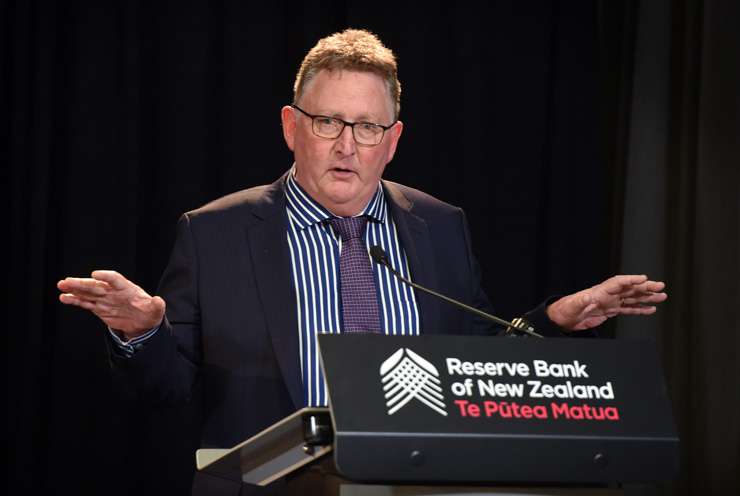Any impact on mortgage rates from Wednesday’s inflation numbers is a waiting game that depends on how the Reserve Bank reacts next month when it announces its next Official Cash Rate hike.
Inflation was 7.2% for the 12 months to the end of December, according to the Stats NZ figures, which are based on the Consumer Price Index.
That’s the same as the annual inflation figure released in October and down slightly on the 7.3% high marked in July.
Jarrod Kerr, Kiwibank’s chief economist, is urging the Reserve Bank to raise the OCR only by 0.50 basis points next month rather than by the 0.75 basis points it has signalled, saying the inflation results show anything more aggressive is not needed.
Start your property search
He thinks the country is at the peak of inflation with the worst coming through now: “Food prices and rent rises and construction costs, they've all remained at very high levels.”
The good news is inflation globally is cooling so imported inflation in the year ahead is likely to be less, however, domestic inflation is still problematic with the Reserve Bank still having work to do.
“But we're actually saying they have less work to do than they think.
“They are telling us they're going to do a 75 basis point hike in February, which is a massive increase, not justified.”
Kerr says business confidence and consumer confidence have collapsed with people nervous about the future, and this is coming at a time that house prices are declining.
“Confidence has been shattered and I don't think the Reserve Bank has to deliver as many rate rises from here.”

Reserve Bank Governor Adrian Orr. The bank’s target of keeping inflation at 2% is still a long way off. Photo / Getty Images
More than 50% of mortgages are rolling over this year, many of them now, from historically low rates of 2% and 3% to more normal but still high rates of 6% to 7%, which is a significant interest expense for homeowners and investors, Kerr says.
“What we're saying is that's having enough of an impact. The Reserve Bank thinks they need to do a lot more - we're saying they don't.”
Kerr says he thinks inflation will fall later this year but it’s currently a challenging time for homeowners and buyers and the housing market will take a while to recover.
However, while Kiwibank forecasts the decline in house prices to be over 20%, it’s already about a 15% decline so there is not much further to go.
He expects rate cuts to come through in November and says that’s when investors and homeowners will breathe a sigh of relief, with price rises being seen again in 2024.
And while he says he can’t offer advice to buyers he says this is precisely the time shrewd investors will be out looking.
CoreLogic’s chief housing economist Kelvin Davidson says the inflation figures are not clear cut, with 7.2% lower than the Reserve Bank expected.
That’s encouraging for the interest rate outlook, and Davidson says a case is building for a less aggressive Reserve Bank OCR increase.
But some commentators are making the point that while inflation could be worse, it is also very broad-based inflation right across the economy and that’s both concerning and a big squeeze on household budgets.
Davidson can see the argument for the Reserve Bank to be less aggressive, but says he can also see the argument that it sticks to its plans to make sure inflation is dead before it pedals back.
If the Reserve Bank does raise the OCR by 0.75 basis points not much changes, he says, but if it only raises it by 0.5 mortgage rates, could begin to creep back down.
Next week’s labour market figures will play into bank’s decision, he says. If the market is “softish” that could lead to a 0.5 increase decision, but if it’s still strong with a low unemployment rate and some wage growth it could be 0.75 rise.
Whatever the case, mortgage rates are still tough for new borrowers and a big adjustment for people refinancing.
Gareth Veale, a financial adviser with EasyStreet Mortgages, says it’s a roll of the dice as to what the Reserve Bank does, but he hopes they back off.
“The only thing that has a real impact on buyers affordability is continuing increases in interest rates.
“The hope is they start to take the pedal off the accelerator in terms of OCR increases and just let things lie for a wee bit like some other countries have done.”

Kiwibank economist Jarrod Kerr: “Confidence has been shattered and I don't think the Reserve Bank has to deliver as many rate rises from here.” Photo / Fiona Goodall
Veale says while banks here have already factored in the Reserve Bank’s signalling of a 0.75 rise, they usually add another percentage or two when it actually happens: “It’s just what happens.
“It could limit people's possibilities and reduce their expectations which sucks a wee bit.”
Brad Olsen, a principal economist and director at Infometrics, says it’s good to see inflation is not still going up – but he says it hasn’t gone down either which means it is not under control and there is still work to be done.
He expects the Reserve Bank will follow through with its 75 basis point increase and says there will likely be continued fall in the housing market as a result of higher interest rates throughout 2023.
Olsen says in his view inflation has not started to roll over as it has in the US, and while the Reserve Bank here looks unlikely to have to go higher than it has already announced, he is not convinced it can go lower.
The Reserve Bank’s 2% inflation target is still a long way away: “I guess the main point here is the fact that it's plateaued at 7.2% is better than the Reserve Bank’s forecast of 7.5% - it's still a hell of a lot worse than the 2% the Reserve Bank wants to see.”


















































































